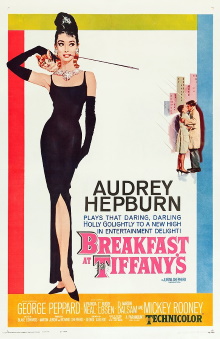
After watching and loving Roman Holiday, it was only a matter of time until I got around to this other famous Audrey Hepburn vehicle. Like everyone else, I’ve heard the song Moon River many times and as this is another Hollywood classic, I expected something similar in tone and style. It turns out that this is completely different and perhaps an early hint can be seen in that it was loosely adapted from a story by Truman Capote.
Failed writer Paul Varjak moves into a new apartment and gets to know the unusual lady who lives downstairs Holly Golightly.. Elegant and evincing a somewhat dreamy attitude to life, she seems to be a socialite and party animal but it soon becomes obvious that she makes most of her money as a prostitute. She finds out that Paul does something rather similar as Paul provides company to a wealthy married woman for money while neglecting his writing. Paul is swept along in the wake of her craziness as the two strike up a friendship. She encourages him to take up writing again while she confesses to him her plans to marry a rich man for his money. He also learns that she has run away from a husband and a family in the countryside and has a brother who she loves very much in the military. Predictably Paul falls in love with her but she seems to be entirely too fixated on material concerns to be interested in true romance.
Once you manage to look past Hepburn’s iconic stylishness and the sweet gentleness of the classic song, you realize that the plot is actually very dark. Holly being paid $50 just to go to the powder room is a thinly veiled euphemism for being paid for sex and as the imprisoned mobster Sally Tomato indirectly points out, sometimes her clients can get rough. Then there’s how she fritters away all of her money without meaning to and the plentiful hints that she is an alcoholic. We’re not even going into how she is naively being used by mobsters to coordinate a drugs ring. This is a young woman whose lot in life is a depressing downwards spiral and whose plans to get out of it is doomed to failure as we can all see. Yet the conundrum of this film is that Hepburn plays Holly as an innocent ingénue who seemingly has no idea that her current trajectory in life will likely lead her to an early death in an alley and the whole thing is played off as a series of funny jokes by a director whose specialty is comedy.
Once you realize what’s at stake here, it feels incredibly offensive to treat Holly’s life with such lightness. It’s doubly cruel when Holly herself treats the other women at the party, presumably in similar circumstances as herself, as objects of derision and ridicule. It’s like saying that those women are skanks but Holly herself can’t possibly be one because she is being played by Audrey Hepburn. That’s not even including the famous case of a white actor putting on a mouth prosthesis and make-up to turn himself into a horrible caricature of a Japanese. This is just such a nasty film on multiple levels. It simply isn’t appropriate material to be made into a romantic comedy. It could have been great as a serious drama and indeed the character of Holly Golightly reminds me of Blanche DuBois from A Streetcar Named Desire before she went off the deep end. But that would require engaging with the tragedy of Holly’s life seriously instead of trying to play it off as humor.
Usually Hollywood classics earn their reputation fairly but in this case, I think it rests entirely on Hepburn’s stylishness and personal reputation. I’m not even sure how many people managed to look past her elegance to realize how ugly her life truly is. My opinion is that casting her for this role was a mistake just as it was wrong to treat this as a comedy. I’m thoroughly disappointed in how this film presses all the wrong buttons and watching it in a modern context is just nauseating.
One thought on “Breakfast at Tiffany’s (1961)”